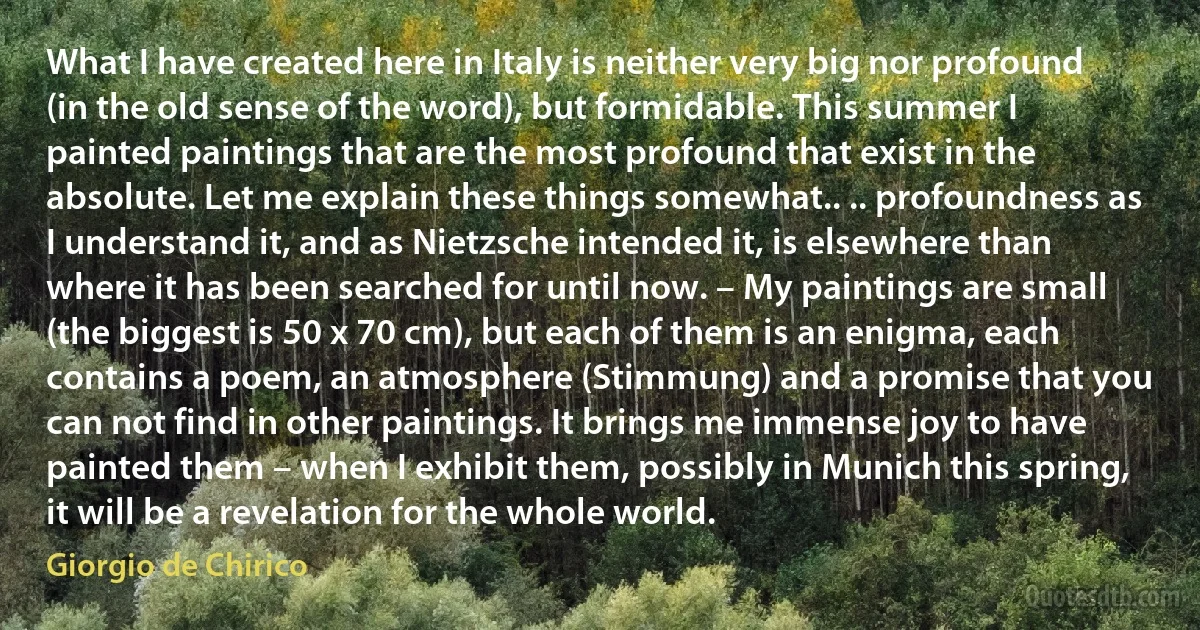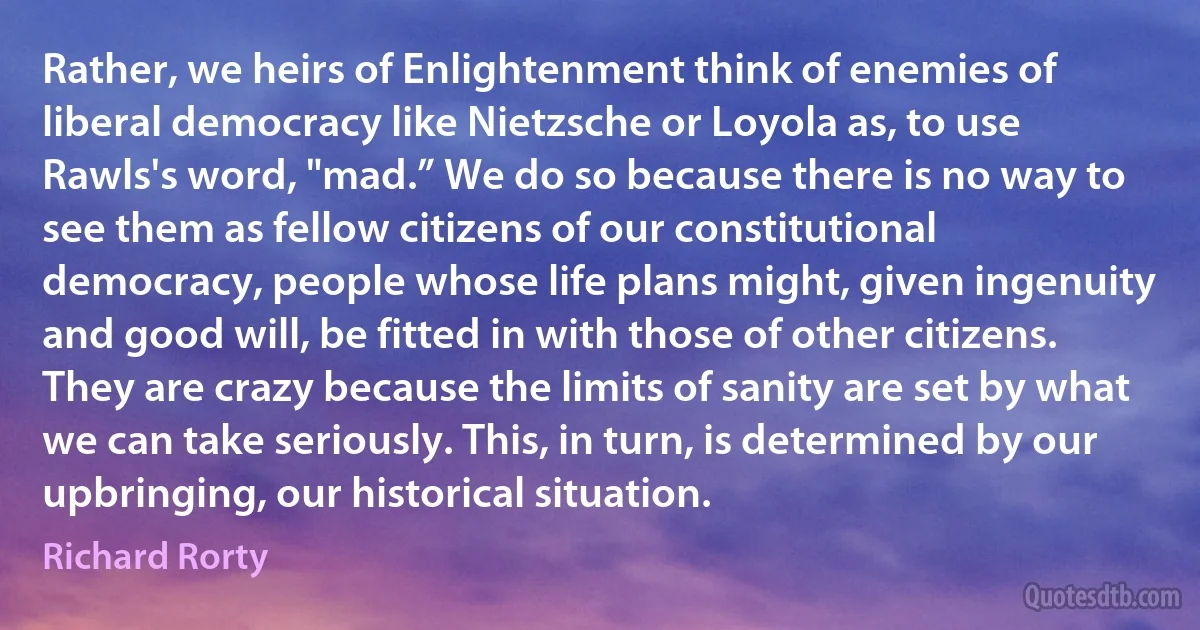Nietzsche Quotes - page 2
As an aphorist, Cioran has no rivals other than perhaps Nietzsche, and many of his philosophies are echoed by Ligotti. But Ligotti is far more disturbing than Cioran, who is actually very funny. In exploring these philosophies, nobody I've read has expressed the idea of humanity as aberration more powerfully than Cioran and Ligotti.

Thomas Ligotti
When during my stay in Egypt I became familiar with the works of Nietzsche, whose polemic against christianity was particularly to my liking, the antipathy which I had always felt against a religion which relieves the faithful of responsibility for their actions (by means of confession) was confirmed and strengthened.

Richard Strauss
In the following decades "Kierkegaard remained completely unknown, Schelling's work was contemptuously buried, and Marx and Feuerbach were interpreted as dogmatic materialists. Then a new impetus came in the 1880's with the work of Dilthey, and particularly with Freidrich Nietzsche, the "philosophy of life” movement, and the work of Berson. The third phase came after the shock of WWI – "Kierkegaard and the early Marxists were rediscovered and the serious challenges to the spiritual and psychological basis of Western society given by Nietzsche could no longer be covered over by Victorian self-satisfied placidity. The specific form of the third phase owes much to the phenomenology of Edmond Husserl, which gave to Heidegger, Jaspers, and the others the tool they needed to undercut the subject object cleavage which had been such a stumbling block to science as well as philosophy.

Rollo May
The upshot is that the values and goals which provided a unifying center for previous centuries in the modern period no longer are cogent. We have not yet found the new center which will enable us to choose our goals constructively, and thus to overcome the painful bewilderment and anxiety of not knowing which way to move. Another root of our malady is our loss of the sense of the worth and dignity of the human being. Nietzsche predicted this when he pointed out that the individual was being swallowed up in the herd, and that we were living by a "slave-morality." Marx also predicted it when he proclaimed that modern man was being "de-humanized," and Kafka showed in his amazing stories how people literally can lose their identify as persons.

Rollo May
Central to the Smithian approach is our willingness to see critically what we observe around us. The sense of comfort that is often associated with being content with the world as it is can seriously hamper the pursuit of justice. This understanding goes strongly against a line of thought that was powerfully presented by Friedrich Nietzshe. ‘The Christian resolve to find the world ugly and bad has made the world ugly and bad', said Nietzshe. I think I can, with some effort, understand what Nietzsche meant, but it is hard for me, even with a lot of effort, to see that Nietzshe's hypothesis helps us to understand the causation or resilience of the nastiness of the world in which we live. Nor, I must insist (this I do as a thoroughly unreligious person), does it offer any obvious insight into the lives and achievements of Martin Luther King, or Mother Theresa, or Desmond Tutu, who have tried to reduce injustice in the world and have done so with non-negligible success.

Amartya Sen
It was good of Friedrich Nietzsche to declare God dead - I declare that he has never been born. It is a created fiction, an invention, not a discovery. Do you understand the difference between invention and discovery? A discovery is about truth, an invention is manufactured by you. It is man-manufactured fiction.

Rajneesh
What was right and true yesterday is wrong and false today. What was immoral and shameful - promiscuity, abortion, euthanasia, suicide - has become progressive and praiseworthy. Nietzsche called it the transvaluation of all values; the old virtues become sins, and the old sins become virtues.

Pat Buchanan
Admirers of the ‘purified' Nietzsche have been hard put to unite his sanctioning of barbarity with an often subtle and rarefied cultural critique. But we can easily dispose of this dichotomy. In the first place, the union of ultra-refinement and brutality was by no means a personal quirk requiring psychological elucidation, but a universal, psychical-moral distinguishing mark of imperialist decadence.

György Lukács
In [19]'46, I had started to awaken to the world. At first, the Russians nationalized everything [in East-Germany / DDR]. Rich people had their property taken away, and the people got access to their libraries, which was wonderful for me. I read Hermann Hesse. Thomas Mann was a little too heavy for me. But Lombroso, Nietzsche. Materialists, I would call them – writers who said there was no god, no spirit, that freedom is an illusion. That affected me deeply.

Gerhard Richter
You misunderstood my words when I said that Michelangelo was a stupid artist... Because I have drunk from another source and a new and marvelous thirst burns my lips – how can I still believe in such artists?! I know what you are thinking when you ask me: 'isn't David a superman? This is how I used to feel, this is what I used to think. The majority of the world's great spirits thought it so.... but now a new air has entered my soul, a new song has reached my ears and the whole world appears totally changed – the autumn afternoon has arrived, the long shadows, the clear air, the serene sky –, in a word: Zarathustra has arrived, do you understand??.... It is only with Nietzsche that I can say I have begun a real life.

Giorgio de Chirico
What we really long for after death is to go on living this life, this same mortal life, but without its ills without its tedium, and without death. Seneca, the Spaniard, gave expression to this in his Consolatio ad Marciam... And what but that is the meaning of that comic conception of the eternal recurrence which issued from the tragic soul of poor Nietzsche, hungering for concrete and temporal immortality?

Miguel de Unamuno
Nietzsche seems sometimes to replace the "transcendence” which stands at the center of traditional accounts-the existence of a transcendent God, or, failing that, a transcendental viewpoint-with that of a continually transcending activity. ... There is no single, final perspective, but given any one perspective, we can always go beyond it.

Raymond Geuss
Monotheistic religions in the West have tended to conflate having a general orientation in life, having a specific theory of the world, having a sense of the positive meaningfulness of one's existence, and having a fixed set of rules for behavior, but these elements are in principle separable. ... The "metaphysical need," ... both Marx and Nietzsche held, is a historical phenomenon that arises under determinate circumstances, and could be expected to disappear under other circumstances that we could relatively easily envisage.

Raymond Geuss
What has been shown by Machiavelli, who is often (like Nietzsche) congratulated for tearing off hypocritical masks, brutally revealing the truth, and so on, is not that men profess one thing and do another (although no doubt he shows this too) but that when they assume that the two ideals are compatible, or perhaps are even one and the same ideal, and do not allow this assumption to be questioned, they are guilty of bad faith (as the existentialists call it, or of "false consciousness,” to use a Marxist formula) which their actual behavior exhibits. Machiavelli calls the bluff not just of official morality-the hypocrisies of ordinary life-but of one of the foundations of the central Western philosophical tradition, the belief in the ultimate compatibility of all genuine values. His own withers are unwrung. He has made his choice. He seems wholly unworried by, indeed scarcely aware of, parting company with traditional Western morality.

Isaiah Berlin
An extreme, unconditional human yearning was expressed for the first time by Nietzsche independently of moral goals or of serving God. ... Ardor that doesn't address a dramatically articulated moral obligation is a paradox. ... If we stop looking at states of ardor as simply preliminary to other and subsequent conditions grasped as beneficial, the state I propose seems a pure play of lightning, merely an empty consummation. Lacking any relation to material benefits such as power or the growth of the state (or of God or a Church or a party), this consuming can't even be comprehended. ... I'll have to face the same difficulties as Nietzsche-putting God and the good behind him, though all ablaze with the ardor possessed by those who lay down their lives for God or the good. ... I'll admit that moral investigations that aim to surpass the good lead first of all to disorder.

Georges Bataille
Nietzsche was a genius because he delighted in persecution. Karl Marx was a dangerous maniac. It is only when the feelings of discontent which he tries to explain coincide with those of a whole class, or a whole nation, that the impassioned theorist becomes a prophet, or a hero; while, if he confines himself to explaining that he would rather have been born an Emperor, they shut him up.

André Maurois



